- Home
- Lisa Appignanesi
Sacred Ends Page 2
Sacred Ends Read online
Page 2
She felt her mask of composure crumbling. The heave of her stomach. She forced her gaze downwards. Faces were always the worst. Poor man. Who was he? What fate had led him to fling himself on the tracks? The ravenous birds must already have got at him. Strange that. So soon. There didn’t seem to be all that much blood where the train had hit him either.
A cry erupted at her side, distracting her from the dead man. A frightened animal sound. She veered round to see Martine Branquart toppling to the ground. She hadn’t noticed that the girl had followed her.
The conductor caught her just in time.
‘Women,’ he muttered. ‘I told her not to…’
He swallowed his words as Marguerite administered a first, then a second slap to the girl’s translucent cheeks. She had no smelling salts to hand.
Blue eyes fluttered open, misty with confusion.
‘Hold her firmly, Monsieur. She’s in my charge. Let’s get her back on the train.’
‘You too, Madame. We’re about to head off, now.’
‘Yes. There’s little we can do for the man. You’ve called for help?’
‘We’ll send some back for him when we reach the station.’
The conductor settled them into their compartment. Aghast, Jeanne, her fluttery little maid, poured coffee from an intact Thermos flask and forced it on Martine.
‘I’m sorry, Madame. So sorry for making a nuisance of myself.’ Martine murmured. ‘I … I thought I saw … I was thinking of Yvette. Like the girl in a story I have been reading.’ Her face was paler than the dead man’s. ‘Under the train.’
‘You mustn’t have such dark thoughts, Martine.’
The girl closed her eyes abruptly.
‘We’ll find your sister. I know we will.’
Martine gave no murmur of assent. The taut face, pent up, was like a child’s again, but somehow less innocent now with those blue eyes shuttered more tightly than a house wilfully closed to the world.
There were things Martine was hiding, Marguerite was certain of it. Until last year, after all, the girl had always lived in the region.
‘Did you recognise the man, Martine? You must tell me.’
The eyes flew open. The girl passed a tongue over dry lips. ‘No, no. No, Madame. Well, yes. At first I thought I did,’ she shivered. ‘But it was just an impression. A wrong one. Because he was so big and ugly, like … like a beast.’
Marguerite decided not to press her. The train had picked up speed. She patted the girl’s long-fingered, expressive hand. Olympe’s hands had been like that. Nervous in their expressiveness. Is that what had made her take Martine up with such alacrity? Was she an echo of Olympe, another frightened girl troubled by a sister? Or perhaps she had reached the age where she needed to help a young woman in order to prevent her from making the mistakes she, herself, had?
‘You’ll tell me later, Martine,’ Marguerite soothed. ‘Later. We have lots of time.’
‘He didn’t have time, Madame.’ Martine’s tongue tripped up her words. ‘Time’s not on our side.’
TWO
La Rochambert rose from a bumpy turn of the road like a graceful and reclusive old friend, too distant from the world to be overly affected by it, yet prepared to shelter and warm the fraught and the weary. Perched on its green hillside, the small, turreted château had a sparkling whiteness emphasised by the dark tiles of its roof and the gathering dusk. The plump roundness of the east and west towers, the mansard windows with their carved mullions, the bell tower above the portico, all smiled at Marguerite with the sweetness of childhood. Where the road dipped and turned again, the row of acacias her father had planted came into view and the gentle slopes of an adjoining meadow. Another turn and the five windows of the far wing appeared, to its side the terraced gardens that eventually led to fields and chestnut copse and another twist of the river.
For a moment as the carriage rattled over a rut, she forgot the dead man on the track and the anxious young woman at her side. She was thrust back into a childhood unencumbered by skirts or propriety. Daddy’s girl, she raced through fields and woods, a free creature delighting in the surprises nature brought. She followed her father everywhere in those years – on visits to greenhouse or stables or coach house, on hunting and fishing expeditions on both the Loir and the Braye, to meetings with overseer and gamekeeper and even to long drawing sessions in the library, where her father guided her hand to shape leaves and flowers, tree frogs and beetles and ants of a dozen descriptions.
The fall from grace had come when she had had to don long, encumbering skirts like the mother she had never really known. Life changed ineradicably. To be a woman was something she had had to learn step by newly shoed step in delicate heeled slippers or laced boots. Even now, she sometimes experienced it all as a masquerade.
Years on, it still troubled her that her father, so enlightened in other ways, had handed her over at sixteen to her great aunt in Paris, the very same aunt who had brought her Martine. He had handed Marguerite over in order to have her married off to the first respectable bidder whose fortune could be stretched to save the old family seat. What else, in the end, were women for? Olivier’s family title was altogether respectable if more recent – since it had been in Napoléon’s gift – than her own, and his fortune stretched easily enough to encompass the upkeep of La Rochambert.
Marguerite stared out of the carriage window at a landscape that was achingly familiar even in its winter shroud. It told her that her description of the past wasn’t altogether fair. She had been infatuated with Olivier at first – his experience, his intelligence, his dignity, the fine lines that gave his features such depth. She had been drawn by his bright silk cravats and brocaded dandy’s waistcoats, sights that dazzled far more than a bird of tropical plumage spotted amidst the sparrows of the valleys.
Back then, Olivier, most urbane of men, had hardly been interested in the old provincial estate. Now, he was as wedded to it as her father had ever been. Though all the finances in the world couldn’t stretch to secure the paternal estate in the family for the longer term: Olivier and she had singularly failed to produce the necessary heir.
The fire in the south salon blazed and crackled, bringing old mirrors to golden life, warming the ancient faded tapestry on the far wall where women reclined on flower-strewn fields. Outside, through the tall glazed doors, the winter terraces were graced with only a few shrubby evergreens and a hedge of summer-fragrant box. Everything was the same, Marguerite noted, but subtly, indecipherably different. She felt this increasingly every time she came. The difference had nothing to do with new furnishings.
She shifted her gaze to the portrait above the fireplace and tacitly greeted the mother she could barely remember outside this frame. Her pictorial standin reigned in the statuesque majesty of glistening burgundy folds and finely coiled hair. Except for the stance, the new coincidence of age and perhaps the curve and sweep of arm and figure, there was little to evoke Marguerite either in feature or colouring.
She turned to Olivier, who paced the length and breadth of the room and had been doing nothing else for a good five minutes. He might have wanted her to arrive in a hurry, but he didn’t yet seem to have his words prepared for her. Nor was there any sign of illness.
He was a tall man, still trim, though heavier now around the jowls. His shoulders had an arrogant set. His nose was proud, his shock of well-trimmed hair greying at the temples and in one daring stripe which swept back from his brow and looked as if it might have been painted, were it not that the shade so closely matched his moustache. He had taken to wearing the tweeds of an English country gentleman rather than the fine worsted suits of his Paris wardrobe. They gave him a diffident, casual air, which belied the man she knew, who could be exacting and punctilious.
The once passionate hatred she had felt for Olivier had long ebbed. What was left, she decided, was a naturalist’s tolerance, mingled with a curiosity about the sheer variety of specimens the world presented. There was also a kin
d of loyal affection: they had both, after all, had to make accommodations. The loyalty was coloured by a muted hue of fear. Olivier was a scorpion whose tail might strike out at any moment. She knew that too well. The handsome if thickening features would offer no warning.
He had stopped pacing now. He was waiting for a servant she didn’t recognise to deposit the tray, light the lamps, pour the tea, offer the pastries in the precise manner he designated. Her father had never managed as much. Even the two golden retrievers who lay by the fire were impeccably trained to keep their panting presence discreet.
The changes the room sported were subtle ones. The chairs had been recovered in a pleasing blue-grey stripe. A walnut clock that chimed the hour stood against the far wall. The array of mounted beetles had gone, to be replaced by a selection of watercolours that might even have been English. She couldn’t fault anything. Olivier was a man of order and taste, even if his didn’t extend to the newest art, with its sinuous, curving lines and bright post-Impressionist colours.
At last, the niceties over, he spoke.
‘You’re wondering why I had you rush here?’
‘I am, Olivier. I am.’
She tempered her impatience with a smile.
‘It’s difficult for me to explain.’
‘I see that.’
‘Perhaps I should start from the beginning.’
She nodded encouragement.
‘Paul and I were planning on a morning’s fishing. The day after Christmas.’
‘Paul?’
‘Of course, you haven’t yet met. Paul Villemardi. He’s a sculptor. Well, he started off as a stonemason. But talented. Very. I’ve set him up in two of the outhouses. He’s creating some work for the garden. Where was I?’
‘You were going fishing.’
‘Yes, yes. Well, we got to the river. I don’t know if you know that stretch. Just past the island, where there’s a turn and the bank gets steeper. About a kilometre or two along from here. Towards Montoire.’
‘Yes.’
‘Well, we saw this basket.’
‘A basket?’
‘Yes. Not very large, nor very small. A wicker fruit basket, perhaps. The kind the peasant women bring their fruit to market in. But inside tthere was no fruit. There was a baby.’
Marguerite swallowed hard and muffled a cry. Olivier’s face beneath its burnished cheeks grew pale and looked away. There was a sudden shifty air about him.
‘A baby? A dead baby?’
He moved towards the window, so that his face was hidden to her.
‘We thought it was dead. It looked dead. We almost left it there. But when we got home, Madame Solange – Armand, her boy, was with us and had run ahead – came rushing and she took the baby in. Took it in to the fire. And while we were waiting for the curé and wondering quite what to do, we heard this, well, this squeal, really. It wasn’t dead. The poor little blighter wasn’t dead.’
‘What a relief. A boy, then?’
He nodded. He started pacing again and Marguerite had to press him.
‘What did you do?’
‘Madame Solange thought we should take him to the Blessed Sisters. You know, the convent just outside Blois. There’s one of those wooden slots in the outside wall for depositing babies in. Unwanted infants. So I rode over towards Blois with Paul. We found the convent all right. The place was deserted. We stared at the old wall with its creeping moss. We located the turning cradle. I opened it and tried to peer through. All I could see was a path and a hedge and some graves. Not a single living soul. And I couldn’t bring myself to do it. Couldn’t leave the babe. He was watching me, you know. With those eyes of his wide open. As if he knew. He could tell. There was something otherworldly about that gaze. Pleading and chastising at once. Anyhow, the curé thought it was right that we had brought him back. He hadn’t been for the convent. He said our finding the babe was meant. Christmas and all that.’
He paused. Marguerite stared at him.
‘I omitted to tell you. Madame Solange had somehow managed to round up a wet nurse, a large, plump, young woman from near Lavardin. And within a day, the child had revived a little. It was miraculous really. He didn’t cry. Not at all. He just watched us. And moved his tiny hands. He wanted to live. He must have wanted very much to live. To live here. With us.’
Olivier made a delicate, aimless motion with his long fingers, then bunched them into a fist, as if he had trapped something.
‘He held on to me. To my finger. So I couldn’t just push this living bundle through a hole in the wall, like some bit of refuse. Abandon him. I began to agree that if I had found the babe, it was because I had been fated to.’
‘Fated?’
‘I thought of Moses.’
‘I don’t understand.’
‘You know. He was found in the rushes.’
‘You see yourself as the Pharaoh’s daughter.’
‘Not quite.’ His lips curled into a faint scowl. ‘It’s as if I’ve been given a mission.’
‘What has fate ordered you to do, if it isn’t to turn the infant over to the good sisters?’
‘That’s why I asked you to come.’
‘Oh?’
‘Yes. I’d like to keep him.’
The statement came at her like a bolting horse. She needed to leap out of its way. Yet she could see that an abandoned child needed to be rescued.
‘I want us to adopt him.’
‘Adopt him?’
That addition knocked her sideways. Took all the wind out of her.
Olivier was staring at her, waiting for a response.
‘I don’t quite know what to say.’
‘No. Of course. I understand. You’ll have to think about it. Because he would be yours, too. We would be a family. A proper family.’
He gave the word an aura of ancestors and bloodlines and social place. She could feel an iron gate coming down with a clang in front of her. There was another behind and two at either side. There was no escape.
Olivier’s eyes burned his will into hers. Nothing would deter him from his path. She could feel it. His expression reminded her of the occasion when his secret life had stood revealed and blazing between them – a fire that had run away with itself and threatened to burn them in its passage, but that he was proudly powerless or unwilling to stop.
They were in the hands of destiny.
Marguerite baulked. She had always baulked at fate’s dictates.
‘It’s a rather large proposition.’
‘Yes, I know. But important. The boy would grow up here, of course. You could still spend a portion of your time in Paris. I would come there more too, if what I have in mind transpires.’
‘But surely it’s too soon to make any kind of decision? Why, the child’s parents may be weeping somewhere. Or even if he was abandoned, the mother might still change her mind.’
Olivier shrugged.
‘And I’d have to know.’ There was a tremor in her voice and she worked to still it. ‘Are you taking any steps to find out how the child found his way into the river? Who his mother was? Or his father? There will have been a father somewhere, Olivier. Unless the angelus has murmured otherwise to you.’
The last had come beneath her breath and without her volition, but he had heard her. A flash of casual brutality edged his features. Olivier had always had the easily irritated humour of a man who had known little but conquest and ease.
‘There’s no need for either sacrilege or sarcasm, Marguerite. If we had our own children, it would be different.’
She had deserved the cut, but for some reason she couldn’t stop herself even now.
‘They, too, would have had need of a father, as well as a mother. There was a man on the tracks, Olivier. A dead man,’ she suddenly added.
‘I’m interested in the living, Marguerite. Not the dead.’ Olivier’s pale blue eyes turned to steel. He moved his attention to the window.
She didn’t altogether know what made her so resistant to h
is plans. In the ordinary course of things, she would have leapt to protect an innocent child from the stigma of illegitimacy, the hardship of overcrowded orphanages. But here, now, all she felt was suspicion. Olivier had something in mind, something that didn’t smell right to her. The whole business was utterly out of character in a man who was ordinarily so interested in heredity, the right heredity. She needed to understand more.
The dead man loomed in her mind, too. Could he have some relationship to the abandoned child? Probably not, but so little normally happened in La Rochambert that wasn’t related to fields or animals, that a link sprang to mind. Here in quick succession were two events, monstrous enough to disturb the flow of the seasons.
Olivier was rapt by some activity in the gardens. Marguerite moved closer to the window.
A stout, caped and white-aproned woman was pushing an ancient baby carriage along the stone path. In the falling light, it took a moment for Marguerite to recognise it as her own. The thin, spoked wheels, smaller in front and larger in back; the pale, metallic, boat-shaped body. She had last used it to keep her kittens in, safe from the foxes who prowled by night. She must have been six or seven then. How she had loved those blind kittens, especially the tiniest one, with a white smudge on its inky forehead. Its mother had chosen to neglect it and Marguerite fed it with a dropper.
‘Shall we have her bring the foundling in?’ she asked.
‘Yes. It’s far too cold out there for him. I don’t know what the woman is thinking of. You can’t trust these wet nurses. Children are always dying in their purported care.’
He went to pull the bell cord by the mantle and turned back to her, the fretfulness still in his face.
‘All this is laudable, Olivier,’ she carried on their prior exchange as if there had been no interruption, ‘but I will want to make enquiries. The infant might have been kidnapped, lost in some way, not just abandoned. Someone somewhere may be pining for him, searching. Have you contacted the police?’

 Memory and Desire
Memory and Desire The Dead of Winter
The Dead of Winter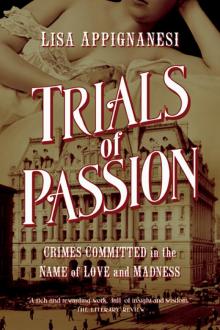 Trials of Passion
Trials of Passion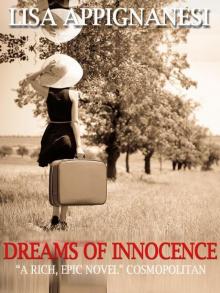 Dreams of Innocence
Dreams of Innocence All About Love: Anatomy of an Unruly Emotion
All About Love: Anatomy of an Unruly Emotion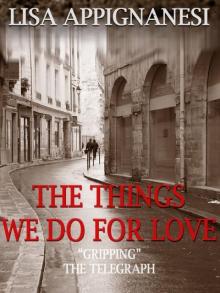 The Things We Do For Love
The Things We Do For Love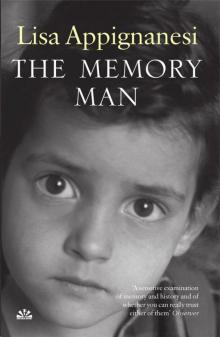 The Memory Man
The Memory Man Mad, Bad, and Sad: A History of Women and the Mind Doctors
Mad, Bad, and Sad: A History of Women and the Mind Doctors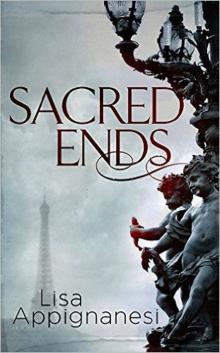 Sacred Ends
Sacred Ends Paris Requiem
Paris Requiem Sanctuary
Sanctuary A Good Woman
A Good Woman